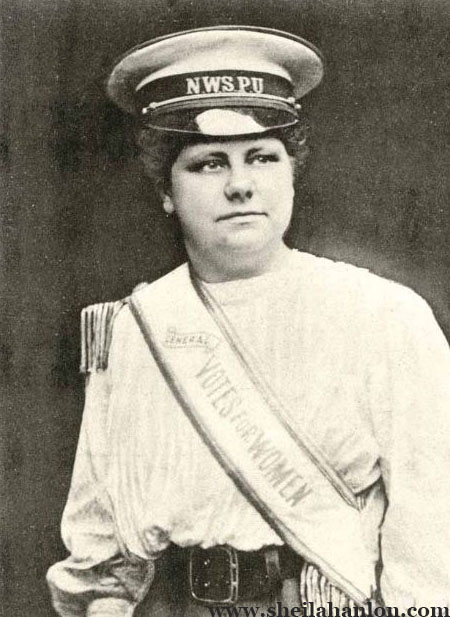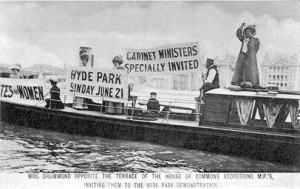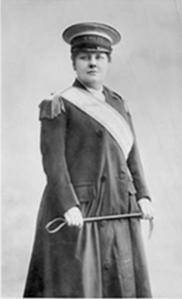
Prominent suffragette Flora Drummond (1878-1949), or “The General” as she was known in WSPU circles, played a key role in organising the marches, processions, and parades characteristic of the suffrage campaign. As an extension of this role, she oversaw the WSPU’s Cycling Scouts, a unique organisation that helped spread the suffrage campaign beyond urban areas.
Flora was born in Manchester to Sarah Gibson who was from Arran and Francis Gibson a tailor. When she was still very young, the family moved to the Island of Arran. At the age of fourteen, Flora moved to Glasgow to attended business school and later enrolled in university courses. Flora qualified as a postmistress, but standing at 5′ 2″ she failed to meet the minimum height requirement and was denied a position. After marrying upholsterer Joseph Drummond, she returned to Manchester, where the couple were active Fabians, Independent Labour Party supporters, and Clarion members. Her work with the WSPU would later take her to London and back to Glasgow.
Flora joined the Women’s Social and Political Union (WSPU) in 1906 after hearing a speech by the Pankhursts, though she may have been informally involved with the group as early as 1905. Soon, she was giving addresses of her own in Lancashire. Her impetus for joining came from a desire to help poor and low waged women, who she felt were treated unfairly by society, something she experienced first hand in her own struggle to find professional employment and as the wife of an intermittently unemployed man. Though she did not share the privileged life many of her WSPU colleagues enjoyed, Flora proved herself to be one of the most dedicated, and distinctive, members of the WSPU’s organising core.
 Flora quickly rose within the ranks of the WSPU to become a salaried officer whose responsibilities included rallies, parades and processions. She was behind some of the WSPU’s most daring stunts, such as mooring a barge outside Westminster to alert MPs to a suffrage rally. Flora’s nickname “The General” came from her efficiency as an organiser, as well as her penchant for leading processions on horseback and in military regalia. In 1909, Flora organised the first WSPU procession in Edinburgh, which attracted an estimated 10,000 women some of whom attended dressed as famous figures from Scottish history. By 1909, Flora was in charge of the Glasgow WSPU branch, in 1910 she instrumented the WSPU Exhibition at the Charing Cross Halls, and in 1914 was present when Mrs Pankhurst was arrested at St Andrew’s Hall, Glasgow. Flora was imprisoned nine times for her role in WSPU action.
Flora quickly rose within the ranks of the WSPU to become a salaried officer whose responsibilities included rallies, parades and processions. She was behind some of the WSPU’s most daring stunts, such as mooring a barge outside Westminster to alert MPs to a suffrage rally. Flora’s nickname “The General” came from her efficiency as an organiser, as well as her penchant for leading processions on horseback and in military regalia. In 1909, Flora organised the first WSPU procession in Edinburgh, which attracted an estimated 10,000 women some of whom attended dressed as famous figures from Scottish history. By 1909, Flora was in charge of the Glasgow WSPU branch, in 1910 she instrumented the WSPU Exhibition at the Charing Cross Halls, and in 1914 was present when Mrs Pankhurst was arrested at St Andrew’s Hall, Glasgow. Flora was imprisoned nine times for her role in WSPU action.
As a natural extension of her role as march organiser, Flora captained the WSPU Cycling Scouts. The WSPU Cycling Scouts were formed in 1907 as a means of spreading the suffrage mission to areas beyond urban centres, especially throughout the countryside. The London branch of the Suffragette Scouts was the best known and Flora, who was then based in the WSPU’s Clement’s Inn head office, served as their captain and champion. Each Saturday up to thirty suffragettes dresses in the purple, white, and green colours of the union, their bicycles decorated with flags and other WSPU swag, set out from their meeting spot in Sloane Square for a destination on the outskirts of the city or beyond.
 In an interview with the Pall Mall Gazette, Flora outlined the group’s tactics, explaining “We ride into a district, introduce ourselves to the police, and tell them we are going to hold a meeting in the village square. Then we get on a chair or a box, as the case may be, form our cycles into a group around it, and deliver the gospel of votes to women. We go to those places where there is no branch, and where our work is not known yet so well as it should be; our object, which we have no difficulty in accomplishing, being to form new branches.”
In an interview with the Pall Mall Gazette, Flora outlined the group’s tactics, explaining “We ride into a district, introduce ourselves to the police, and tell them we are going to hold a meeting in the village square. Then we get on a chair or a box, as the case may be, form our cycles into a group around it, and deliver the gospel of votes to women. We go to those places where there is no branch, and where our work is not known yet so well as it should be; our object, which we have no difficulty in accomplishing, being to form new branches.”
WSPU branches around Britain, including Scotland, were encouraged to form their own brigades of Cycling Scouts along the same line of the one Flora captained. The Suffragette Scouts were an important part of the WSPU’s extension work, and one of the most intensive uses of bicycles as part of the suffrage campaign.
Sources:
Elizabeth Crawford, The Women’s Suffrage Movement: A Reference Guide 1866-1928 (2001)
“Flora Drummond,” Oxford Dictionary of National Biography
Leah Leneman, A Guid Cause: The Women’s Suffrage Movement in Scotland (1995)
Pall Mall Gazette, 1907






